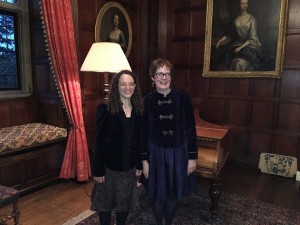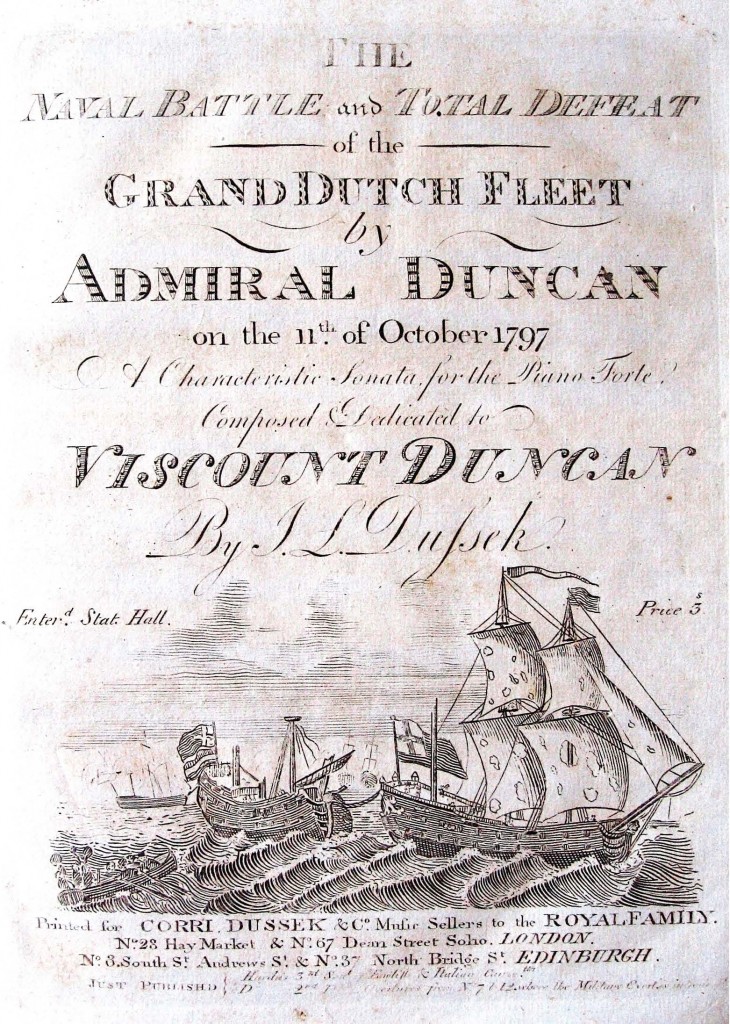La Vittoria – Waterloo in music

Katrina Faulds has recently finished her PhD on dance and dance music in the English country house c. 1800. She is also an accomplished performer on early pianos, and last week saw her presenting some of her research in sound: In November last year, Dr Penelope Cave and I were offered the opportunity to perform a concert at Chawton House Library as part of the Music department’s regular collaborative series. As we had given joint papers and performed piano duets together on several occasions during our doctoral studies, we were delighted at the prospect of combining our musical minds once again. The concert was scheduled for May 2015, when Chawton House Library, like many other institutions around the country, was engaged in commemorating the 200th anniversary of the Battle of Waterloo.

This seemed an ideal opportunity for us to combine two of our research interests: battles and balls. Rather than specifically focussing on music that was directly linked to the Battle of Waterloo itself, we decided to take a broader approach. Using music found in the libraries of two of England’s stately homes, Killerton House (Devon) and Tatton Park (Cheshire), both of which are managed by the National Trust, in addition to the extensive sheet music collection housed at the British Library, we concocted a programme with readings and slides that explored how music published for domestic consumption represented Britain’s military exploits from the early days of the French Revolution through to 1815.
We included solo piano and piano duet compositions celebrating the naval victories of Richard Howe, Adam Duncan and Horatio Nelson, in addition to Arthur Wellesley’s defeat of Napoleon Bonaparte at Waterloo, interspersing the music with historical background and contemporary commentary on both the men and their battles. Publishers and composers were quick to capitalise on the patriotic fervour these victories inspired. However, their output was more diverse than the production of generic battle music. For example, Richard Howe’s triumph over the French near Brest in 1794 stimulated the creation of several artworks and theatrical productions. The cantata, La Vittoria, after which our program was partially named, was staged at the King’s Theatre less than a month after the battle. Featuring the renowned Italian soprano Brigida Banti as the Goddess of Victory, the production also included a hornpipe danced by Madame del Caro. The melody for the hornpipe was arranged as a rondo by the Bohemian composer, Jan Ladislav Dussek (1760-1812), who fled to London upon commencement of hostilities in France; the music for this arrangement is found in the Tatton Park collection.
 Perhaps the highlight of the evening, however, was Penelope’s performance of Dussek’s tribute to Adam Duncan’s victory in the Battle of Camperdown (1797), The Naval Battle and Total Defeat of the Grand Dutch Fleet by Admiral Duncan. An eighteenth-century pianistic tour de force, representing variously cannon fire and joyous sailors, the score contains short programmatic descriptions that guide both the performer and listeners through the different stages of the battle. During the performance, the audience enthusiastically joined in with flag waving at the commencement of Rule Britannia! The whole concert was performed on an 1828 Stodart grand piano, on loan to Chawton House Library, in the wood panelled dining room. We are extremely grateful to the staff at Chawton, in particular Dr Gillian Dow (Executive Director of Chawton House Library) and Shelley Hughes, for making our visit so enjoyable, and we very much look forward to performing there again in the future.
Perhaps the highlight of the evening, however, was Penelope’s performance of Dussek’s tribute to Adam Duncan’s victory in the Battle of Camperdown (1797), The Naval Battle and Total Defeat of the Grand Dutch Fleet by Admiral Duncan. An eighteenth-century pianistic tour de force, representing variously cannon fire and joyous sailors, the score contains short programmatic descriptions that guide both the performer and listeners through the different stages of the battle. During the performance, the audience enthusiastically joined in with flag waving at the commencement of Rule Britannia! The whole concert was performed on an 1828 Stodart grand piano, on loan to Chawton House Library, in the wood panelled dining room. We are extremely grateful to the staff at Chawton, in particular Dr Gillian Dow (Executive Director of Chawton House Library) and Shelley Hughes, for making our visit so enjoyable, and we very much look forward to performing there again in the future.

